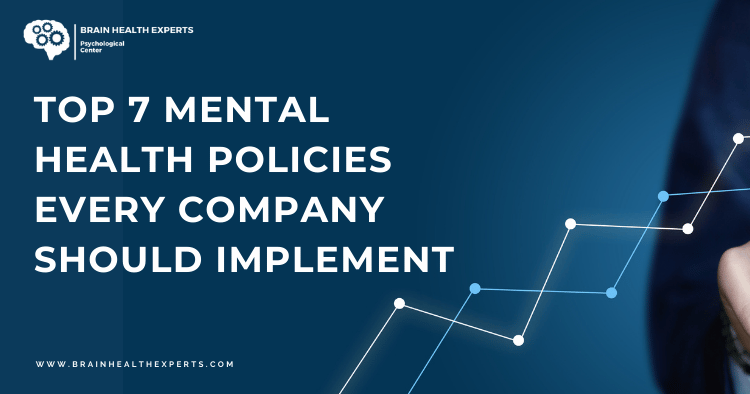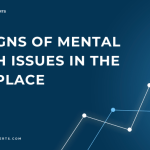Table of Contents
- Understanding Mental Health in the Workplace
- 1. Employee Assistance Programs (EAPs)
- 2. Flexible Work Arrangements
- 3. Training and Awareness Programs
- 4. Open Communication Channels
- 5. Mental Health Days
- 6. Supportive Work Environment
- 7. Regular Mental Health Assessments
- Conclusion
- FAQs
Understanding Mental Health in the Workplace
Mental health is often overlooked in corporate culture, despite its profound impact on employee productivity, engagement, and retention. According to the World Health Organization (WHO), depression and anxiety alone cost the global economy approximately $1 trillion each year in lost productivity. Therefore, implementing effective mental health policies is not just a moral obligation but a strategic business decision. In this article, we’ll explore the top seven mental health policies every company should consider implementing.
“Investing in mental health isn’t just about compliance; it’s about creating a culture where employees feel valued and supported.”
1. Employee Assistance Programs (EAPs)
What are EAPs?
Employee Assistance Programs are confidential services that provide employees with access to mental health resources. These can range from counseling services to legal advice, financial consulting, and even wellness programs.
Why Implement EAPs?
- Accessibility: EAPs provide immediate access to professional help, encouraging employees to seek support without the fear of judgment.
- Anonymity: Employees can access these services discreetly, fostering a culture of openness about mental health issues.
- Cost-Effective: Investing in EAPs can reduce healthcare costs for the organization in the long run.
“Providing EAPs shows employees that their mental health matters to the organization, which can lead to increased loyalty and job satisfaction.”
How to Implement EAPs:
Choose a reputable provider and ensure that services are tailored to meet the needs of your workforce. Promote the EAP regularly to ensure that all employees are aware of its benefits. Also, look for 10 effective strategies to enhance workplace mental health.
2. Flexible Work Arrangements
What are Flexible Work Arrangements?
Flexible work arrangements allow employees to adjust their work hours or locations to better fit their personal lives. This can include remote work, flexible hours, and compressed workweeks.
Benefits of Flexibility:
- Work-Life Balance: Employees can manage their personal and professional commitments more effectively, reducing stress.
- Increased Productivity: Studies show that employees who work flexibly often report higher levels of productivity and job satisfaction.
- Retention Rates: Companies that offer flexible arrangements tend to have lower turnover rates.
“Flexibility at work isn’t just a perk; it’s a necessity for many employees who juggle various responsibilities.”
Implementation Tips:
Create clear guidelines for flexible work policies and ensure that managers are trained to support their teams in a flexible environment.
3. Training and Awareness Programs
Why Training Matters:
Training programs focused on mental health can help destigmatize mental health issues and equip employees with the tools to support themselves and their colleagues.
Key Components:
- Workshops: Regular workshops on mental health awareness can educate employees about recognizing signs of mental health challenges.
- Management Training: Equip managers with the skills to identify and address mental health issues within their teams effectively.
“Knowledge is power. By educating employees about mental health, we can foster a more empathetic and supportive workplace.”
Resources for Training:
Consider partnering with local mental health organizations or hiring professional trainers. The National Alliance on Mental Illness (NAMI) offers excellent resources for workplace training. For further ideas, look into top 7 stress management workshops 2024 that can be tailored to mental health training.
4. Open Communication Channels
Importance of Open Communication:
Creating an environment where employees feel safe to discuss their mental health without fear of stigma is crucial.
How to Foster Communication:
- Regular Check-Ins: Encourage managers to have regular one-on-one meetings with their team members to discuss workload and well-being.
- Anonymous Feedback: Implement anonymous surveys or suggestion boxes to collect employee feedback on mental health policies and practices.
“Open communication can break down barriers and help create a culture that prioritizes mental wellness.”
Tools to Use:
Platforms like Officevibe or Culture Amp can help facilitate anonymous feedback and improve employee engagement.
5. Mental Health Days
What are Mental Health Days?
Mental health days are designated days off that employees can take to focus on their mental well-being, just as they would for physical illness.
Why They Matter:
- Normalization: By officially recognizing mental health days, companies signal that mental health is as important as physical health.
- Prevent Burnout: Allowing employees to take time off can prevent burnout and increase overall job satisfaction.
“Recognizing mental health days sends a powerful message: it’s okay to take a break for your mental well-being.”
Implementation Strategy:
Establish a clear policy regarding mental health days and ensure that employees know they can take them without any stigma attached. This aligns with 10 effective stress management strategies for the workplace.
6. Supportive Work Environment
Creating a Supportive Culture:
A supportive work environment promotes mental well-being by fostering relationships among employees.
How to Build Support:
- Peer Support Programs: Establish peer mentoring or buddy systems where employees can offer support to one another.
- Wellness Initiatives: Organize team-building activities, wellness challenges, or mindfulness sessions to encourage a culture of care.
“A supportive workplace is one where employees can thrive both personally and professionally.”
Evaluation:
Regularly assess the effectiveness of these initiatives through employee feedback and adjust as necessary.
7. Regular Mental Health Assessments
Why Assessments are Important:
Regular mental health assessments can help identify potential issues before they escalate.
How to Implement:
- Surveys: Conduct anonymous mental health surveys to gauge employee well-being and identify areas for improvement.
- Professional Assessments: Consider bringing in mental health professionals for periodic assessments and workshops.
“Regular assessments can be the first step in preventing larger mental health crises within the workplace.”
Frequency of Assessments:
Aim to conduct these assessments at least annually, with the option for more frequent check-ins depending on employee feedback.
Conclusion
Implementing mental health policies in the workplace is not just beneficial; it’s essential for cultivating a healthy, productive work environment. By prioritizing mental health, companies can enhance employee satisfaction, boost productivity, and reduce turnover rates. Remember, a happy employee is a productive employee!
“Let’s make mental health a priority, not just an afterthought.”
FAQs
1. Why is mental health important in the workplace?
Mental health significantly affects employee productivity, engagement, and overall workplace morale. Addressing mental health helps create a more supportive and efficient work environment.
2. How can I advocate for mental health policies at my company?
Start by gathering data on the benefits of mental health policies, then present your findings to management. Consider forming a mental health committee to promote initiatives.
3. Are mental health days considered vacation days?
It depends on company policy. Some companies allow mental health days as separate from vacation days, while others may include them under general sick leave policies.
4. What resources are available for mental health training?
Organizations like NAMI and the Mental Health America offer training resources and support for companies looking to implement mental health programs.
5. How can I support a colleague struggling with mental health?
Listen without judgment, offer your help, and encourage them to seek professional support if needed. Be a supportive presence and respect their privacy.
By implementing these policies, companies can take a significant step towards fostering a healthier workplace, ultimately leading to happier and more productive employees. Let’s prioritize mental health together!





